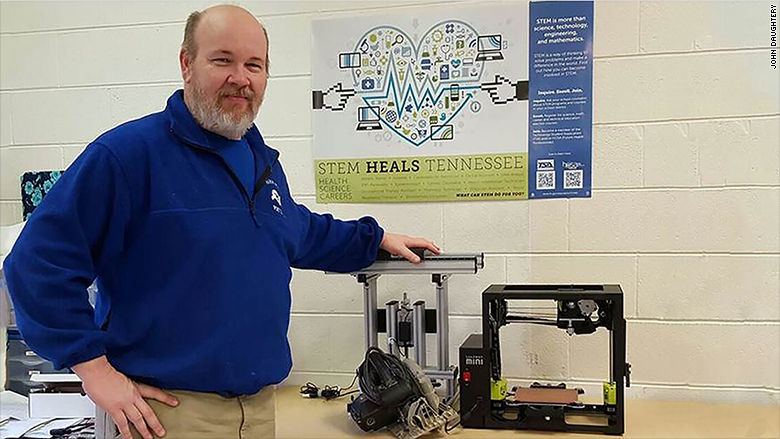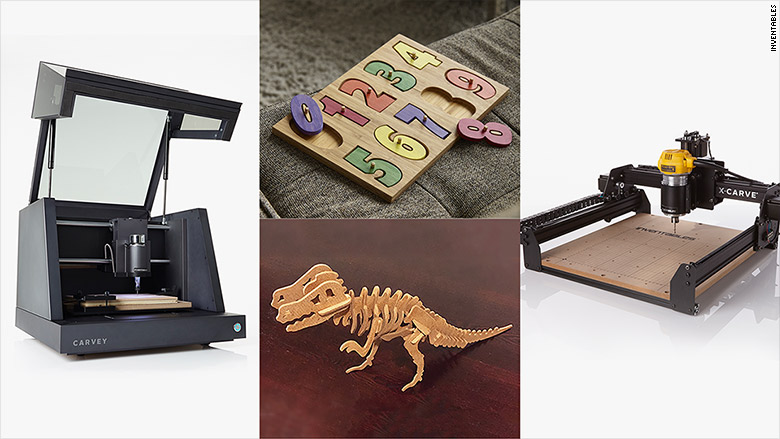
John Daugherty has been teaching science for 23 years, and he says this year is going to be the best yet.
In the fall, Daugherty's Tennessee high school introduced a STEM course for the very first time.
"Most of our students have no clue how things are manufactured. I'm going to have so much fun teaching them," he said.
His search for equipment led him to Zach Kaplan, whose company Inventables makes state-of-the-art 3D carving machines.
Different from a 3D printer, Inventables' machines carve into material -- wood, plastic, metal, even wax. The two styles are tabletop versions of much larger CNC milling machines used by industrial manufacturers.
"You can create real objects like boardgames, puzzles, jewelry, robots -- even guitars," said Kaplan. "They basically turn anyone into an inventor."
Related: Wanted: 100,000 new STEM teachers
But the machines are expensive -- between $1,000 and $2,000. Lucky for Daugherty, Kaplan wanted to get his machines into the hands of students. He'd recently made a pledge to donate one machine to a school in all 50 states.
"We wanted people with ideas and inspiration but no money to have access to them," he said.
In June 2015, Inventables invited K-12 schools to participate in a contest.
Schools sent in written and video submissions explaining why they needed one of the machines and how they would use it in their curriculum.
586 schools from 49 states participated (no submissions came in from Delaware). 78% were public schools and over half were high schools.
On Tuesday, Inventables announced the winners.
Related: The most innovative schools in America
Daugherty was keen to enter Harriman High School into the contest.
"All I have right now is a circular saw and a mini 3D printer for my class," he said.
Still, his debut STEM class has been busy building benches and model bridges and designing paper roller coasters.
Harriman High is a rural public school with 350 students, 70% of whom are from disadvantaged families. The blue collar community lacks many local jobs. But manufacturing, especially of auto parts and industrial parts, has taken off in adjacent cities, said Daugherty.

He believes that having a robust STEM program will better prepare his students for life after graduation.
"These [manufacturing] jobs pay an average $45,000 starting out of school," he said. "Not all of my students will go to college. I want to prepare them for jobs that they'll have a real shot at."
In the meantime, he can't wait to tell his students that they won.
"They've been asking me every day," he said. "There's no way we could have afforded a 3D carving machine otherwise."
Related: This is how you make math fun
Greg Kent's elementary school is similarly in need of advanced technology. He is a teacher and technology coordinator at Kailua Elementary School in Hawaii, a budget-strapped public school where 50% of students qualify for free or reduced lunch.
Kent badly wanted a 3D carving machine to take the STEM program to the next level, but the school couldn't afford it.
"In Hawaii, we are resource poor," said Kent. "90% of our energy and 95% of our food is brought here. So most of us haven't been exposed to making things. Anytime we can leverage technology and teach students how to create things, it becomes a very powerful lesson on how to be prepared for the 21st century."
Kent said he wants to use the new carving machine to kickstart a maker space in the school where students can bring their inventions to life.
"Ideally, [it] will grow into a community maker space," he said.
Both teachers see Kaplan's gift as an important step for training the next generation.
"It's a great disservice in America with schools doing away with shop and STEM programs," Daugherty said. "It has turned us into a nation of consumers instead of a nation of inventors. Kids are naturally curious and like to make things. We shouldn't stop that."



